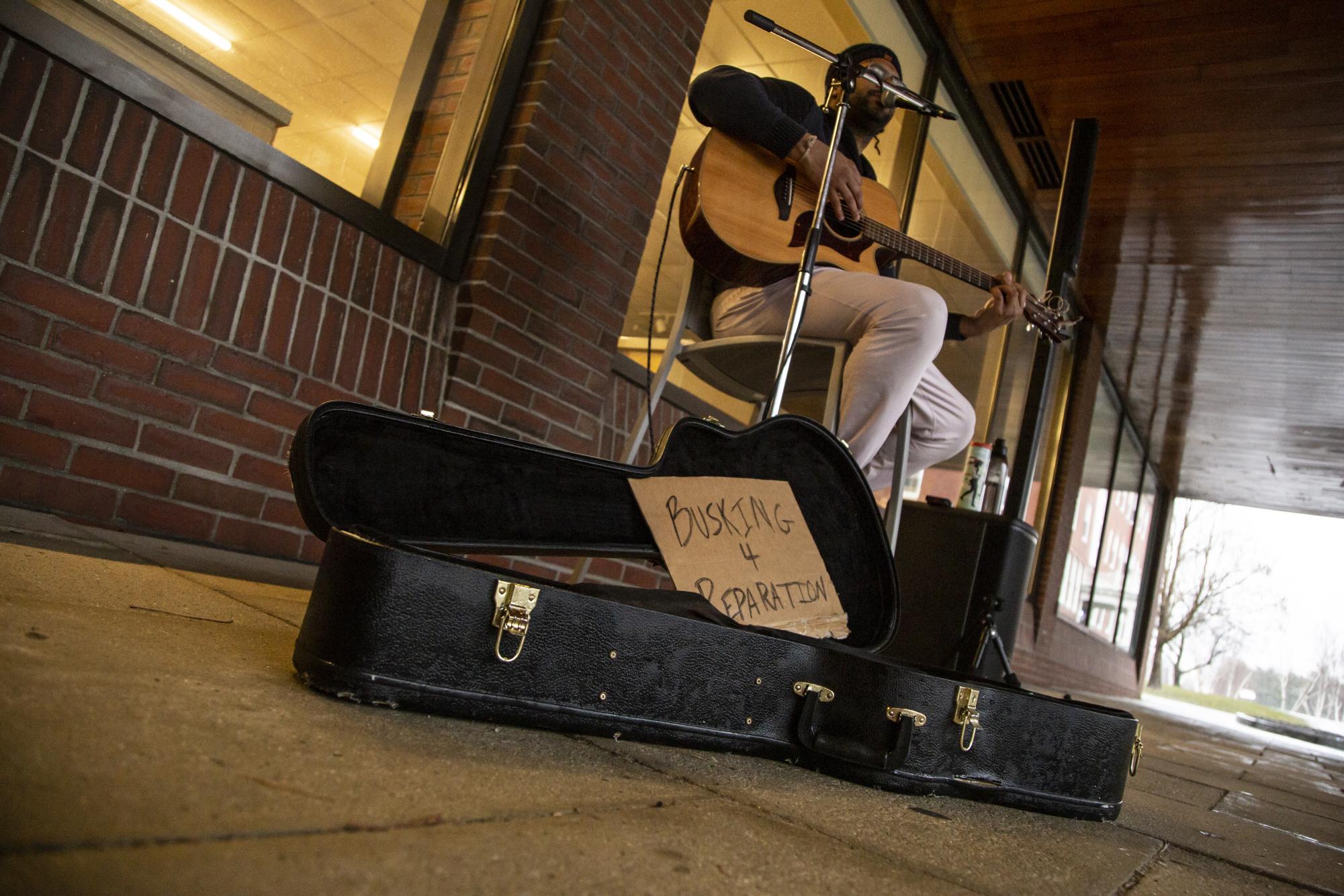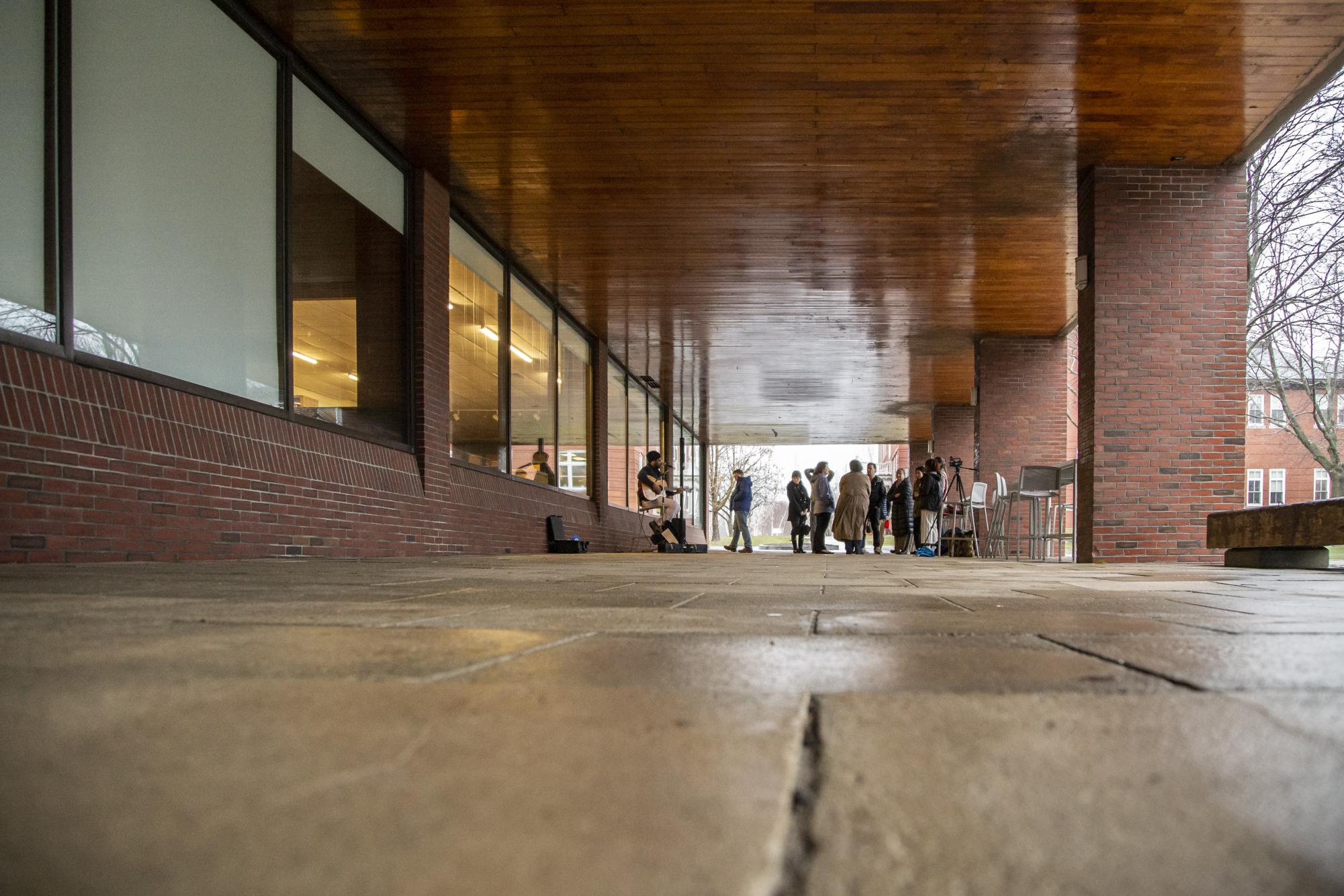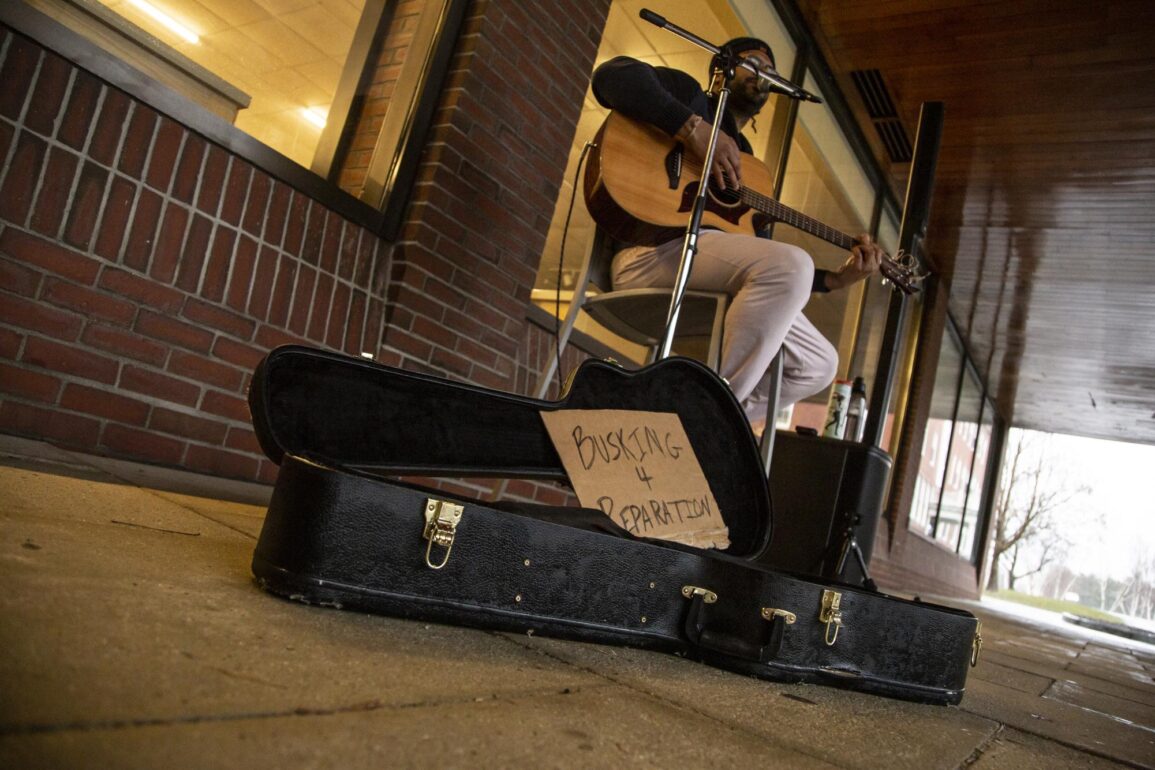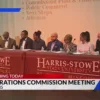A wild rainstorm blows across campus, drenching people as they hurry between buildings. Hiding from the torrent, I’m standing with a small group of students and faculty under the library arcade listening to a windswept performance by Professor of Dance Brian Evans. With the drum of rain as background Evans is singing.
This performance is part of a larger project by Evans called Busking for Reparations. In the series, Evans is performing around campus singing original compositions, reading poems and playing guitar. His work focuses on his experience as a Black man in the United States and the need for reparations. He got the inspiration for the project about three years ago during a conversation with former Assistant Professor of Theater Cliff Odle.
[Evans]: We were just talking about institutional discrepancies about like, what does it mean to be a person of color, be a human of color, an artist of color, faculty of color, and, and systems that didn’t necessarily have you in mind when they were created, um, systems that are often given the benefit of the doubt. And so my hope with Busking for Reparations, especially since I’m new in Maine, is to have a conversation, all right, about what does repair mean? Typically, reparations can be talked about as direct payments to American descendants of slavery. But then that comes, that comes up and brings up other questions, like more meta questions, like, should we think about repair always in a capitalistic sense? Should we think about repair as reaching some sort of standard, which is typically a white supremacist standard. If we dive into Afrofuturism, what would it have looked like if the transatlantic slave trade never happened? Right? Where would we be? What would the world look like if we didn’t need to have conversations reparations?
[Beiser]: In addition to what Evans mentioned, the UN adds that reparations can include rehabilitation such as medical and psychological care, truth seeking, recovering or reburying remains, public apologies, memorials and commemorations. In his project, Busking for Reparations, Evans is pushing his audience to consider creative solutions for what this could look like.
[Evans]: So we were like, well, what if we just like posted upside of commons and busked, right? Like he played bass and I sang and I play guitar and I was like, what if we just did that? What if we just put up a sign that said busking for reparations and what would that do? Would it start a conversation?
[Beiser]: And they ended up never doing it. Professor Odle left Bates for a new job in North Carolina and the idea went into hibernation. Partially, Evans says because he wasn’t sure it would really change anything. But, after a challenging year, Evans began to reconsider what repair means.
[Evans]: I have on my syllabus, the phrase go before you’re ready. And go before you’re ready doesn’t mean go before, you know, like that you’re unprepared that like, you have no idea what you’re doing. It’s just That that tipping point of like, am I ready? Am I ready? Am I ready? And then and then the moment passes, right?
[Beiser]: And that’s exactly why he’s doing it now, three years later.
[Evans]: I think I have a bit of like, I don’t, I don’t care what it does. I just want to try it. I know what I hope it does and if the worst thing that happens is like, no one responds. It’s just. I still get to play music and, and make art, which is what I want to do anyway.

[Beiser]: So what is busking anyways? Well to me, it’s someone on a street corner, crooning old melodies with a guitar and hat. But for Evans, it’s all about the space it creates for collaboration and vulnerability.
[Evans]: To like say a poem or do a spoken word piece that directly addresses the emotional impact that it’s having on me and then have a conversation that that has that as the given, right? So I don’t have to explain to you why I’m even talking about reparations. Like you just experienced me relaying the emotional impact it’s had on me.
[Beiser]: Evans says the busking is an exciting space to occupy. It’s uncontrolled in a way that Evans says is slightly terrifying. But, it also offers a unique opportunity for co-creation with the audience.
[Evans]: If I’m having a conversation with the audience, I don’t know what’s going to be said. And therefore there already is this a rarefied space of temporality. Like it will only happen now. The conversation will only exist in this place, even if I said similar things before the conversation or did similar things afterwards. That space, that indeterminate space is, I think, where a lot of solutions can lie because nobody knows the answer, right?
[Beiser]: And this is where Evan’s background in art again ties directly into his approach to this project. He says he has spent his career trying to convince students that they are artists and dancers and musicians because he believes that we need creativity to imagine sustainable solutions that work.
[Evans]: If you’re in a classroom and somebody says something you don’t agree with and you want to say something, awesome. If you want to write a poem and give it to that person later, great.
If you want to like write a whole book, and, like, shove it under people’s doors. You know, it’s like, there’s so many things you could do, but more often than not, we don’t do anything. And that sucks.
[Beiser]: Evans says it’s these same cognitive pathways that we build in art classes and dance studios that help us imagine solutions and answers that don’t yet exist.
[Evans]: Since the beginning of my career, it’s always been like, if I’m considered black or white, but I’m trying to go from magenta, how do I actually get to magenta? If I only have black or white or the gray scale as my palette, how do I do that? And the best I can do is to co-create the intersubjective space where even though we might be looking at gray, we’re all in agreement that it’s magenta right now, maybe just for this moment, right? And that’s where the art space is exceptionally positioned to do this work, because that’s what we do all the time. We literally make stuff up, and then we all agree that that stuff exists.
[Beiser] But Evans believes that if we want any chance at achieving repair in our country we need to practice standing up for ourselves and others in little ways, so that when something bigger happens, we are more apt to flex against the constraints of the system and challenge the establishment.
[Evans]: I just want to put myself in a situation where I get to practice standing up for myself, standing up for other people, standing up and against a system that I know and has been proven time and time again, that it doesn’t often take into account the individual when it comes to injustice or harm and tends to steamroll unless enough people say no, and then it shifts.




